
 Instagram
Instagram
Spermidine's Benefits: Food Sources, Longevity and What is It?
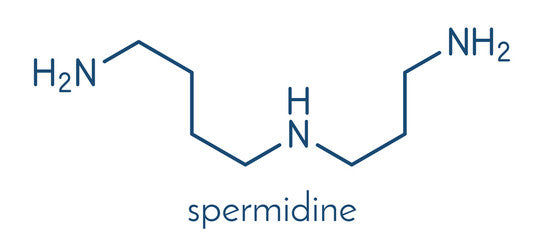
Related products
Spermidine is a polyamine compound that is naturally synthesised in the human body and sourced from various foods. Contemporary studies focus on potential roles of spermidine in supporting cellular health and enhancing longevity.
Polyamines are abundantly available within certain types of matured cheeses like cheddar or blue mould; fermented soybeans famously integral Japanese cuisine - natto; specific mushroom variants such as shiitake oyster mushrooms along whole grain products including wheat germ oat bran.
Scientific findings state that there is a connection between consumption increasing lifespan due to their capability to boost autophagy which is a natural process employed by the body to remove damaged organelles thereby rejuvenating cells and extending life tissue organs. Regular intake has indeed piqued the ongoing curiosity of medical practitioners aiming to illuminate yet explored pathways having a fundamental role in maintaining human wellbeing.
Dr Robert Howard professor of old age psychiatry at UCL observes "It's still early days but evidence so far indicates that spermidine holds promise for brain health as we grow older" However he emphasised the requirements for comprehensive research to confirm the full extent of impact.
What Is Spermidine?

Spermidine is a type of polyamine compound that includes an organic structure characterised by two –NH2 (amino) groups and three methylene (-CH2-) linker units. Spermidine is responsible for regulating numerous metabolic processes within the cell due to its critical role in maintaining the stability of cellular functions.
Spermidine was first discovered initially by Antonie van Leeuwenhoek in 1678 and it has since been found ubiquitous across all living organisms — from bacteria to plants and humans alike. From a historical standpoint, early investigations into this chemical traced back decades involving clinical trials linking it with various health benefits primarily focused on age-related disorders.
The biological importance of these compounds stems from their essential roles in fundamental aspects like DNA synthesis stabilisation or gene regulation recapitulated through actions including cell proliferation, differentiation, and apoptosis among others making them important keys to unlocking complex mysteries of human physiology metabolism.
One primary function lies in the fostering process known as autophagy which is a self-cleaning mechanism the body uses to clear out damaged cells and promote regeneration of newer healthier ones enhancing overall vital organ longevity and resulting in improved quality of life, particularly among the elderly population.
Benefits of Spermidine
Longevity and Anti-Aging
Spermidine stands out for its multiple benefits, most notably in promoting longevity and anti-aging. The compound aids in slowing down the natural process of cellular ageing by enhancing a mechanism known as autophagy - a naturally occurring regeneration procedure where old or damaged cells get replaced by healthier ones.
A trailblazing study published in the Journal of Aging revealed individuals with high levels of dietary spermidine showcased better heart health and lower blood pressure compared to counterparts consuming less. It further suggested that frequent ingestion coincided with increased lifespans, providing a strong indication of how critical a role this substance plays within the human body.
In terms of mechanisms, action showcases a remarkable effect on initiating the cell renewal process – Autophagy's unique property makes it stand apart among other substances dedicated to promoting well-being, especially among older adults established through a series of clinical trials conducted over the last decade.
Another notable experiment disclosed regular intake correlated with slower cognitive decline often observed as one age demonstrated improved memory performance participants again paved the way for interest metabolism and overall brain functionality. Therefore it seems to harness potential delay onset debilitating conditions such as dementia and Alzheimer's disease taking centre stage in various research areas across the globe right now.
Immune System Support
Spermidine holds significance when it comes to boosting the immune system. Offering support, these polyamines are involved in multiple immunological reactions.
The effect on a person's immune system entails improving the ability to react and resist illnesses induced by disease-bearing pathogens. It bolsters the expansion of T-cells, which are pivotal white blood cells that combat infections.
A study reported that spermidine supplementation improved the human body’s responses to vaccines- demonstrating its potential role as an adjunctive agent during vaccination campaigns.
Moreover, ground-breaking data from research published in NIH revealed dietary consumption positively influenced gut microbiota health which plays a pivotal role in maintaining balanced systemic functions thus contributing towards overall well-being by modulating local systemic immune defences.
Cardiovascular Health
Spermidine, as highlighted in emerging scientific research, has shown a significant role in fostering cardiovascular health. This small but mighty polyamine compound seems to be linked directly with heart health improvement.
A study revealed that consuming more dietary Spermidine (SPD) has been linked to a lower risk of cardiovascular diseases (CVD) and overall mortality rates. Specifically, SPD obtained from vegetables, cereals, legumes, nuts, and cheese appears particularly beneficial in reducing death due to CVD as well as other causes.
Spermidine is believed to enhance the process known as autophagy – which translates literally from Greek as 'self-eating,' indicating it assists cells rid themselves of damaged components thus promoting rejuvenation thereof. In reference specifically towards the cardiac system, it essentially means helping maintain healthy functioning muscle tissue, effectively leading to longevity and a good overall condition organ itself thereby averting gamut-associated disorders commonly manifesting advancing age population.
Cognitive Function
Spermidine has shown potential benefits for cognitive function and brain health. It accomplishes this by stimulating autophagy, a crucial process within cells that removes toxins and repairs damage.
A preliminary multicentric double-blind study investigated the impact of oral spermidine supplementation on cognitive abilities in older individuals. With a participant pool of 85 subjects ranging in age from 60 to 96 years, memory tests were conducted across six nursing homes located within Styria. Findings indicated a clear association between increased intake of these polyamine compounds and enhanced cognitive function among patients presenting mild to moderate dementia symptoms, particularly evident with higher dosage groups.
Additionally, it appears to exhibit some form of influence upon enhancement cognition Based on preliminary laboratory tests observations point towards improved learning memory skills conditional strategically increased animal models work still progress more human trials are needed to confirm the exact degree correlation.
Cancer
Spermidine has garnered attention for its potential in cancer management. Numerous studies over the years have substantiated evidence suggesting an intriguing role of these natural polyamines in preventing and combating this global health menace.
Spermidine achieves anti-cancer properties through several mechanisms - one significant being the initiation of autophagy, a cellular process that removes abnormal protein build-ups and damaged cell components. By enhancing autophagy, spermidine helps to restrain uncontrolled cell multiplication which characterises malignant growths, thus limiting progression while promoting overall well-being.
Moreover, research states Spermidine reduces inflammation – an often-overlooked factor sustained can trigger tumour development. Enhanced intake mitigates chronic inflammatory response thereby reducing associated risks of diseases including cancer cases due to action observed in both lab settings and population-based nutritional investigations.
An additional study suggests that augmented consumption of polyamines like spermidine has been linked with decreased oncogenesis and restrained tumour growth. This is seemingly due to its role in anticancer immunosurveillance along with controlling polyamine metabolism processes. Notably, the Spermidine or Spermine N-1-acetyltransferase (SSAT) — a vital enzyme maintaining balance within the body's overall polyamine levels— also functions as a notable diagnostic indicator commonly observed in human cancer cases.
Blood Glucose Levels
Spermidine presents intriguing characteristics in the management of blood glucose levels. Emerging animal and human studies indicate a potential role for this naturally occurring compound in supporting metabolic health, particularly concerning glycemic control.
Spermidine has positive effects on insulin sensitivity - an essential factor influencing how effectively the body's cells use available sugar (glucose). Improved insulin action has been associated with reductions in fasting plasma glucose levels among individuals struggling with prediabetes or diabetes conditions.
Notably, spermidine-induced enhancement of cell autophagy contributes towards maintaining pancreatic β-cell function. These are key cells within the pancreas responsible for producing insulin; hence their optimal operation holds significant relevance when it comes to managing blood sugar regulation efficiently.
Other Health Benefits
Spermidine, with its diverse roles within biological systems, has recently been associated with numerous health benefits. Simultaneously acting as both a nutritional supplement and an integral part of cellular pathways, it presents multiple advantages for human well-being.
Spermidine possesses anti-inflammatory properties which makes it essential to immune response regulation. By dampening excessive inflammation — often linked to chronic diseases such as heart disease or arthritis — intake of dietary spermidine helps maintain balance within the body's inflammatory reactions thus promoting general wellness.
Spermidine has also shown potential for benefits related to bone strength. This polyamine substance contributes towards fostering healthier bones by enhancing osteoblast differentiation which plays a key role in new bone tissue formation, leading to improved bone density. Moreover, it helps manage chronic inflammation issues that often result in the weakening of the skeleton over time.
Food Sources Of Spermidine
- Soybeans: Particularly fermented soybean products known as natto are high in spermidine.
- Mushrooms: Types such as Shiitake or Oyster mushrooms contain this compound.
- Green Peas: This common vegetable is a good source of spermidines too.
- Whole Grains: Foods like wheat germ and oat bran are rich in these compounds.
- Cheese Varieties: Matured cheeses, including cheddar and blue mould types, have higher levels of polyamines
- Pears - Another commonly available fruit that's packed with beneficial nutrients, including Spermidine.
- Chicken Liver- It contains a considerable amount of dietary polyamine
- Broccoli-A superfood that is widely considered due to its various health benefits including the presence of a high concentration of Spermidines
- Cauliflower – Like broccoli other cruciferous vegetables are often found to be rich in natural sources mentioned ingredients well.
Daily Recommended Intake
An exact daily intake recommendation has yet to be established by health authorities; however, researchers suggest an increase in dietary consumption could potentially lead to improvements in cellular regeneration processes associated with ageing - an area still under scientific scrutiny.
There is a disparity in the amount of spermidine contained in different foods, highest concentrations were found in mature cheese aged more than three months at 120 mg/100g followed close second peas lentils carrying approximately 80-90 mg per equivalent weight meanwhile fungi had about half amount thus reflecting importance diversity during meal planning maximise any potential benefits obtained while enjoying a varied diet.
Integrating these nutrients into regular eating patterns need not be challenging simply requires some conscious effort One way might include incorporating whole grain options in breakfast cereals breads lunches dinners Adding a variety of mushroom species meals provides an additional boost Simultaneously consider sprucing dishes using flavorful tasting cheeses ensure the taste isn't compromised quest attain better overall wellness.
Bottomline
Spermidine, a polyamine compound inherent in nature, serves vital purposes within biological processes — one of which includes extending cellular lifespan. Receiving growing attention from scientific researchers recently due to its anticipated potential therapeutic effects on age-related conditions and fertility enhancement. Dietary sources rich in these compounds consist of fermented soybeans-known as natto, varieties of mushrooms like shiitake or oyster types; whole-grain foods including wheat germ & oat bran plus an array of mature cheeses such as cheddar/blue mould ones among many others.
Frequently Asked Questions
What is spermidine and its benefits?
Spermidine is a naturally occurring polyamine compound that plays significant roles in human physiology and metabolism. Its benefits are potentially vast, with research suggesting it aids cellular health, enhances fertility, and even contributes to longevity.
What is the best source of spermidine?
The best source of spermidine varies based on dietary preferences but includes fermented soybeans (natto), certain mushrooms like shiitake or oyster varieties, whole grains such as wheat germ or oat bran, mature cheeses including cheddar or blue mould types among others.
Where is spermidine found?
As an intrinsic part of living organisms' metabolisms from bacteria to humans alike, sporadically traversing the food chain - spermidines make their way into our diet through various food items we consume daily.
What is the role of spermidine?
In terms of its role presence ensures the stability of critical metabolic processes within cells fundamental aspects of DNA synthesis gene regulation cell proliferation differentiation apoptosis primary one fostering autophagy natural self-cleaning process the body uses to clear out damaged and rejuvenate new healthier ones to enhance overall vitality organs involved.
Does spermidine help you live longer?
Research indicates engaged consumption is associated with lower incidences of cardiovascular neurological diseases and eventual promotion of extended lifespan although these findings are still subject to an ongoing investigation for comprehensive validation throughout the scientific community.
Can spermidine reverse ageing?
While premature merely speculating any direct action reversing ageing endeavours instead focuses on slowing down cellular level via enhanced autophagy reviews have presented an association between long-term intake and improved cognitive performance elderly population indicating the potential to mitigate certain age-related disorders thus promoting a better quality of life in advanced years.

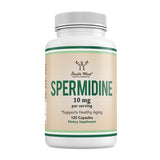

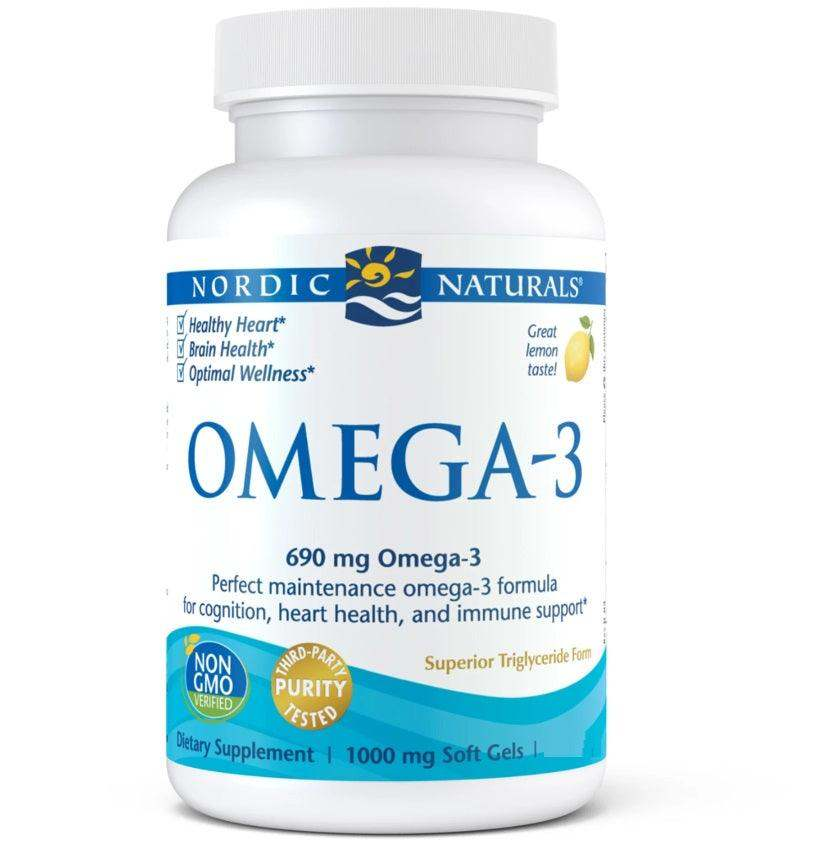
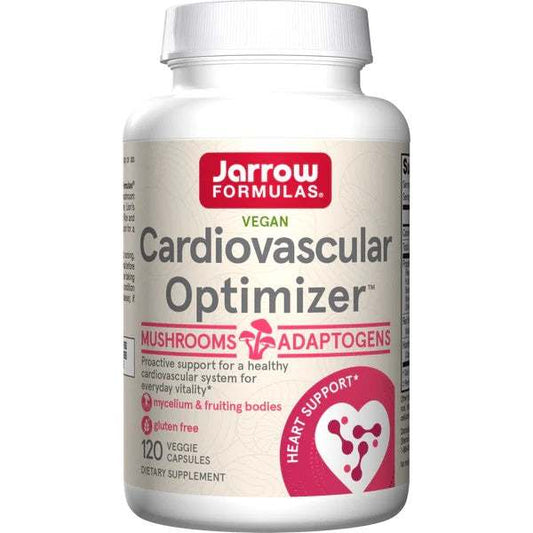
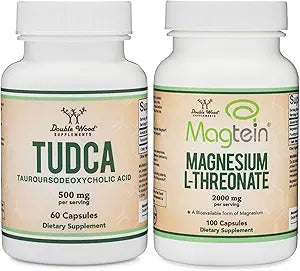

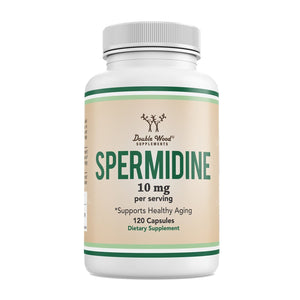





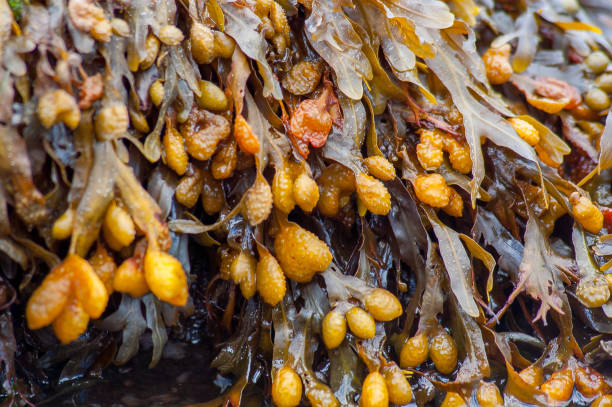

 Rated Excellent by 26,523+ Reviews
Rated Excellent by 26,523+ Reviews